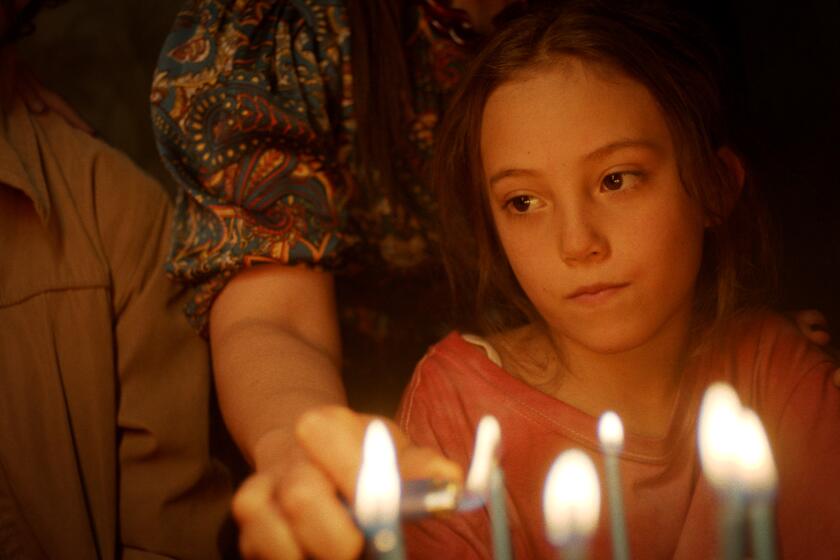Her film, ‘Tótem,’ is intimate, but director Lila Avilés is already a big deal
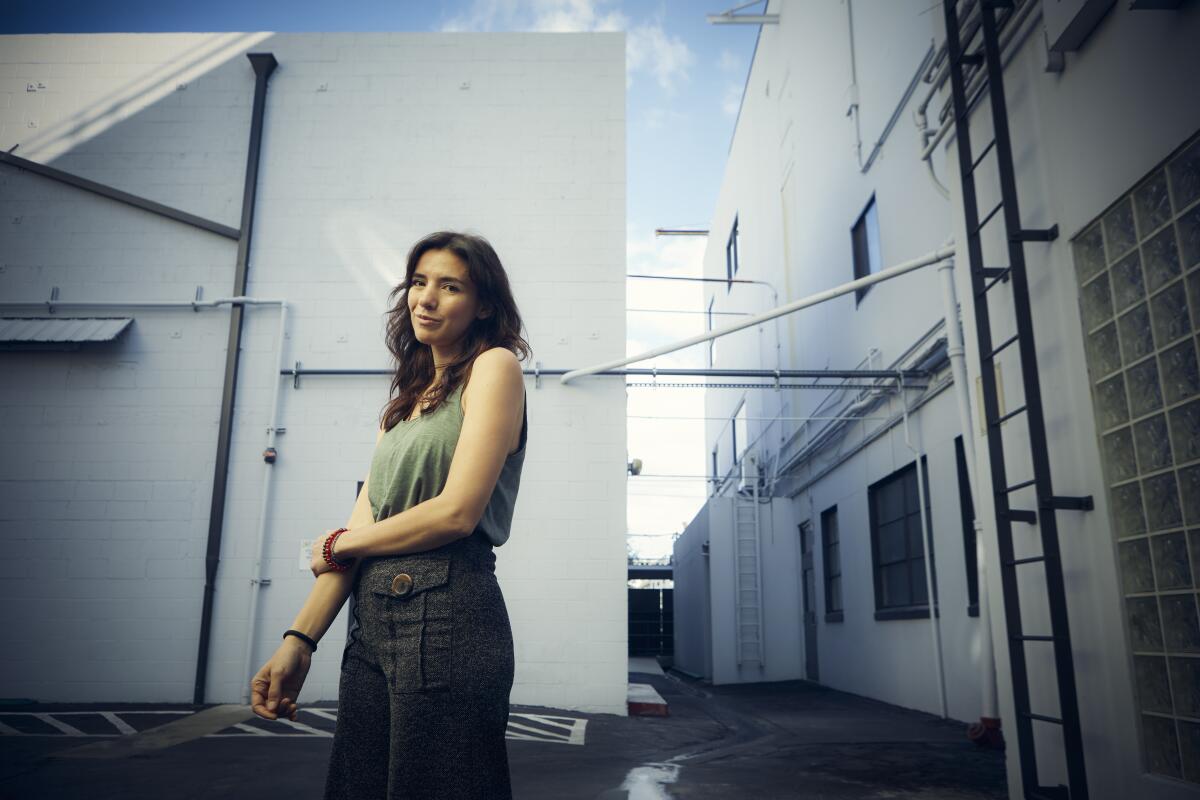
- Share via
Built from intuitive hunches — she calls them “corazonadas” — the work of Mexican writer-director Lila Avilés plays like an invitation into her characters’ most vulnerable states, not to judge them but to share in their experience.
“Tótem,” the latest of her understated miracles (it’s Avilés’ second feature after 2018’s “The Chambermaid”), unfolds over a single day as a Mexico City family plans a birthday party that doubles as a mournful celebration of life. Sol (Naíma Sentíes), a perceptive 7-year-old, wants to spend more time with her terminally ill father, weak from cancer and suffering in a back room. Instead, she watches the adults cope through distinct expressions of love, baking an elaborate cake or nursing a bonsai tree. Woven into its profound look at loss, “Tótem” also features plenty of levity and luminosity.
“Directing is an exercise in taking care of hearts,” Avilés, 42, tells me in Spanish about her approach to working with the ensemble, including the young Sentíes, who was 8 at the time of shooting. Although “Tótem,” in theaters Friday, didn’t receive an Oscar nomination for international feature, its soul-stirring power has gained Avilés several famous fans. Salma Hayek Pinault recently boarded the project as an executive producer.
“‘Tótem’ manages to uplift you under tragic circumstances,” Hayek Pinault says via email when asked why she responded to the film. “Lila has the ability to transform the ordinary into the extraordinary, reminding us of the importance of the simple things in life.”
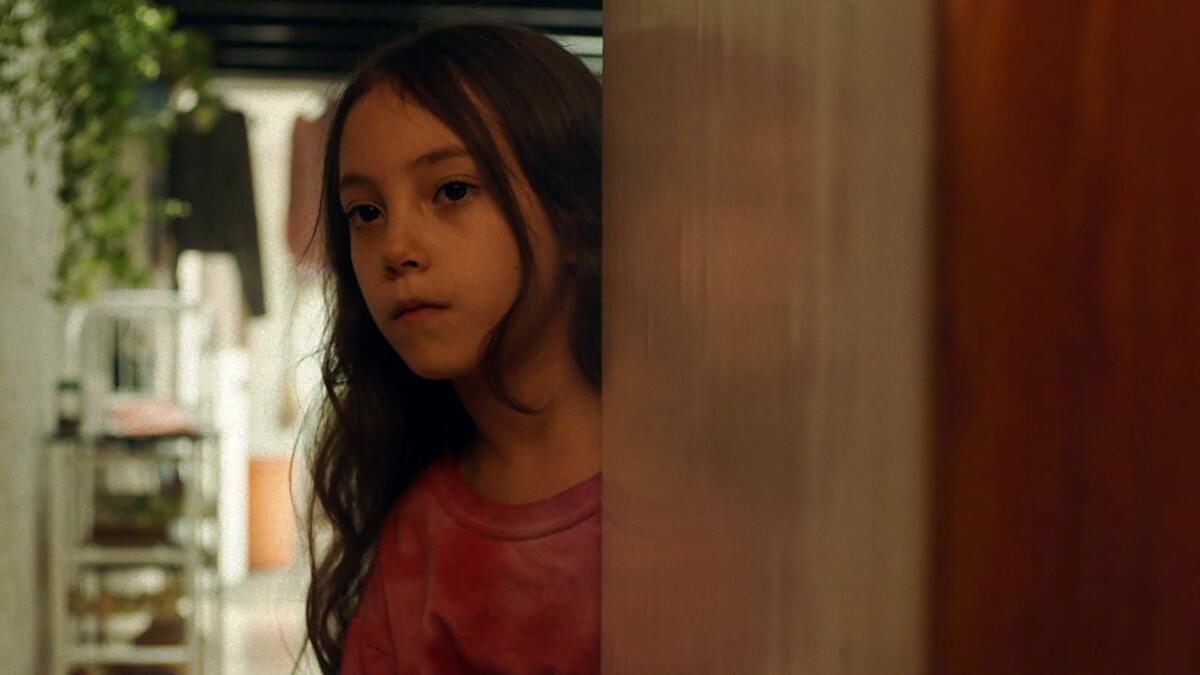
Additionally, all three of Mexico’s famous “Three Amigos” have been vocal about their admiration for Avilés’ work. “Birdman” director Alejandro González Iñárritu hosted a Q&A with Avilés in Los Angeles last month. Guillermo del Toro took to social media to sing the praises of “Tótem.” And “Roma’s” Alfonso Cuarón introduced a screening of the movie at the Telluride Film Festival in September.
On the phone while in Los Angeles, Cuarón describes “Tótem” as a “miniature about everyday life broken by a sense of loss.” He is especially impressed with the spontaneity that Avilés elicits from Sentíes scene after scene. “That can only be achieved by a director who knows perfectly what she wants,” Cuarón says. “Lila’s greatest tools are the clarity of her vision and her rich inner world.”
Sitting in a swanky West Hollywood private club, Avilés seems out of place. Her down-to-earth demeanor radiates gentle resolve when speaking about moviemaking not as a cerebral practice but rather a profession that runs on instinct.
“I fiercely believe that we, humanity, must listen to our intuition more closely,” says Avilés, “to let go of control a little bit and connect with something deep within us.”
The specter of death looms over a birthday party in this remarkably intimate second feature from the Mexican writer-director Lila Avilés (“The Chambermaid”).
For its maker, “Tótem” evokes the comfort of “a warm bowl of soup,” an affectionate embrace (“apapacho,” she calls it). The film is, at once, complex in its exploration of impending sorrow and simple in the way it illustrates how family can help us feel less alone.
“The movie came from the deepest love, which is the one I have for my daughter,” the director says. “It was nice to get rid of any notions of style and let the film speak to me.”
“Lila’s genius lies in the fact that she is not afraid to feel,” says Teresa Sánchez, the Sundance-winning actor who has played supporting parts in both of Avilés’ features. “She throws herself into the abyss to direct, to write, to give herself entirely.”
The impetus to focus on a child’s inner world took hold of Avilés when her own daughter lost her father at a young age. She remembers observing her girl’s grieving process, a painful period that fed into the screenplay for “Tótem.”
“I always say that childhood is destiny,” Avilés says. “There is something in those early years that marks who we become, that tells us which way to go.” (Her early short film, 2016’s gently comic “Dèjá Vu,” actually starred her daughter — now a teenager — playing an office worker trapped in the body of a child.)
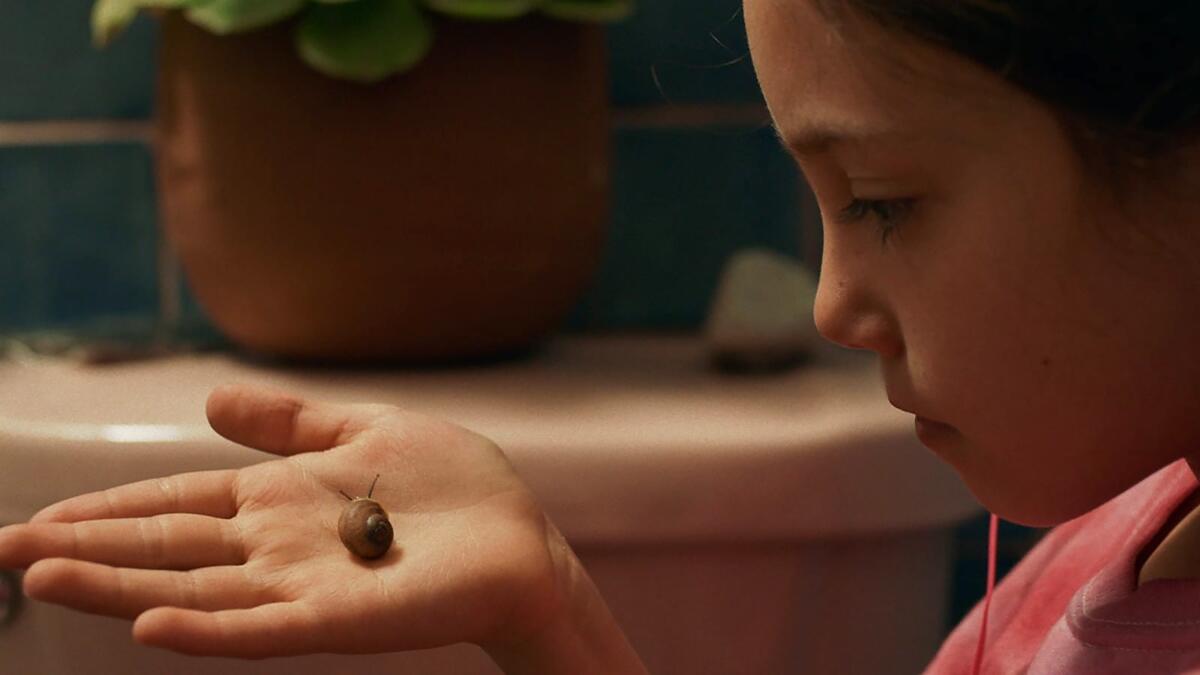
“In this life trying to label us and move us toward what is hegemonic, we have to return to those first callings from when we were little,” says Avilés. “I spent a lot of time alone as a kid. Luckily I had a big imagination, and I could invent a stupid game with two toothpicks.”
Unlike many of her contemporaries making waves in Mexican cinema today, Avilés is self-taught and never went to film school. She initially pursued acting on stage and screen while also producing plays.
But a desire to direct was bubbling. And already, her connection to acting, a craft in which she never felt fully at home, was cooling. Onstage during a 2018 performance of Janne Teller’s opera “Nothing,” she knew that would be her farewell.
“There is a biological death, but there are also those deaths that change our personality — you are one way and then something happens and something changes inside you,” she says, as much about Sol’s journey in “Totem” as her own change in vocations.
“Lila has so much faith in what she’s felt since she decided to become a filmmaker that she doesn’t pay attention to whether there’s a safety net or not,” says Sánchez. “I felt so cared for by Lila. She scrutinizes you and that is a gift, because many directors take care of the form but do not take care of the substance.”
From a Latin music heavy hitter taking on serious acting to a famous Chilean heartthrob hanging out in Oakland, here are the 7 movies playing at Sundance that we are most excited about.
For the casting of “Tótem,” Avilés enlisted her “Chambermaid” star and friend Gabriela Cartol as co-casting director.
“Lila is my compass in life and in fiction,” Cartol says. “When I have doubts on which career path to choose, I go to her. I know she’ll talk to me from a very sincere and caring place.”
To find a young person who could embody Sol, the director searched widely until one of the actors already cast in the film, Iazua Larios, recommended her niece, Sentíes. Her confidence sparked a curiosity that the other auditioning candidates didn’t.
“Naí had never acted before and it wasn’t like she gave the best performance at first,” Avilés admits. “But I loved getting to know more about where her heart was, where her mind was.”
Directing the children (Sentíes and Saori Gurza, who plays Sol’s preschool-age cousin) reminded Avilés to remain flexible. “They don’t put the weight on things that adults do,” she says. “They have a free spirit and say, ‘Let’s see if the scene turns out well and if it doesn’t, we’ll repeat it,’ and that alone makes things turn out better.”
“Tótem” captures the flow of an imperfect family in which what’s left unexpressed engenders conflict between people who otherwise deeply love each other. The bittersweet drama unfolds in a chaotic environment, rendering it intensely human.
“I want to be thorough in making sure the film feels alive,” the director says. “And as a viewer, I am a little tired of seeing so many perfect films.”
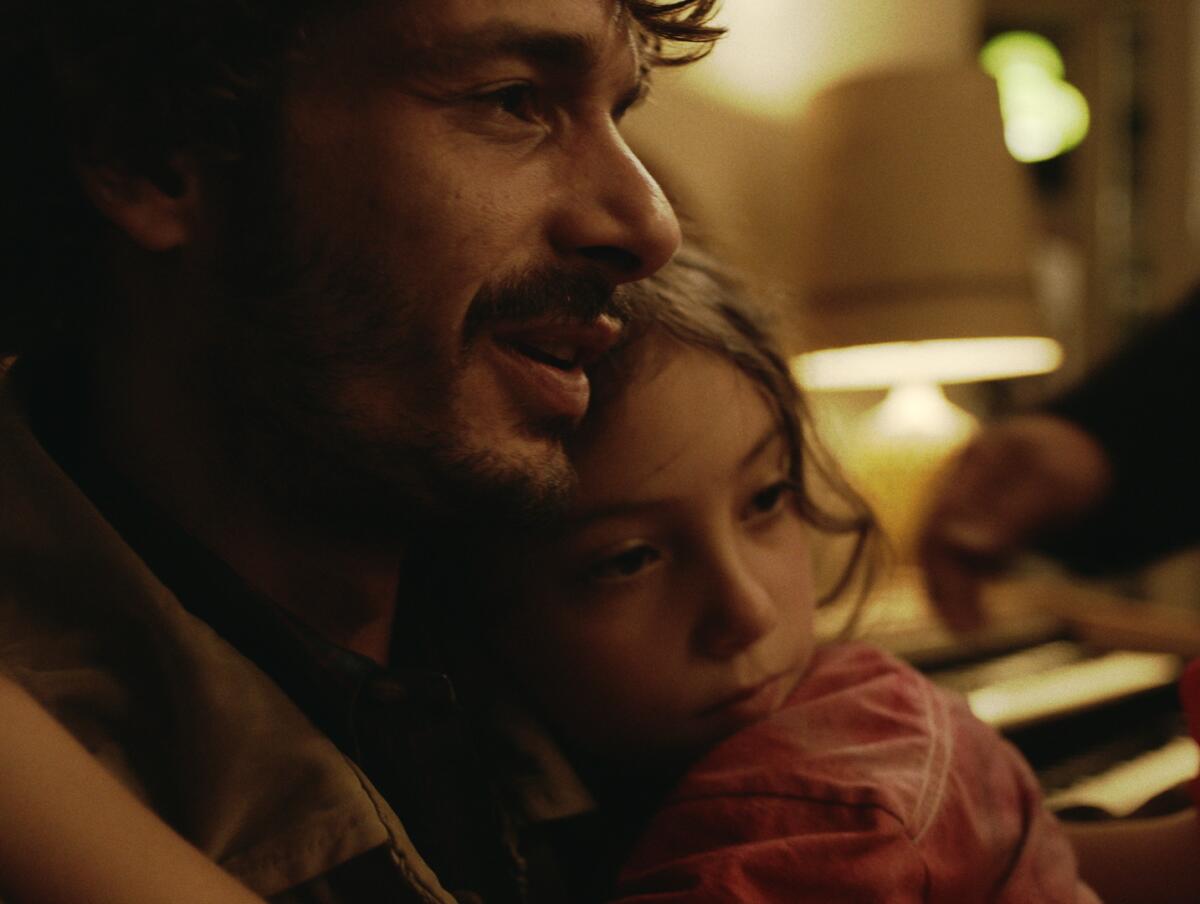
“Totem‘s” dialogue is peppered with colloquial words and phrases that ring true to Mexican viewers, particularly those from the country’s capital. ”When I write, there is a moment when I start laughing, when I say, ‘This character speaks like this,’ and I start to invent little words or ways of speaking,” the filmmaker says. (A slang term for work— “la chambis” — made it into “The Chambermaid.”)
As rooted in specifics as she is, Avilés now finds herself amid a Los Angeles awards campaign. It doesn’t seem likely to throw her.
“Cinema has become my totem,” she says. “When you’re filming, everyone — the sound engineer, the actors — is in that space of full presence that is more present than the present. You become very focused on your consciousness.”
But would she change her mind if the powers that be suddenly offered a superhero franchise?
“That doesn’t interest me,” Avilés says, smiling. “In this world there are too many flesh-and-blood heroines and heroes that surround us everyday in our lives. Those are the type of heroes that I would love to continue telling stories about.”
It’s hard not to walk away with a warm impression of Avilés, who searches for the upside (“lo lindo,” she’d say) in every experience. It’s as if everything she says or does is an act of gratitude. Yes, she’s a bit bohemian. But somehow, like her movies, it all feels sincere.
More to Read
Only good movies
Get the Indie Focus newsletter, Mark Olsen's weekly guide to the world of cinema.
You may occasionally receive promotional content from the Los Angeles Times.
